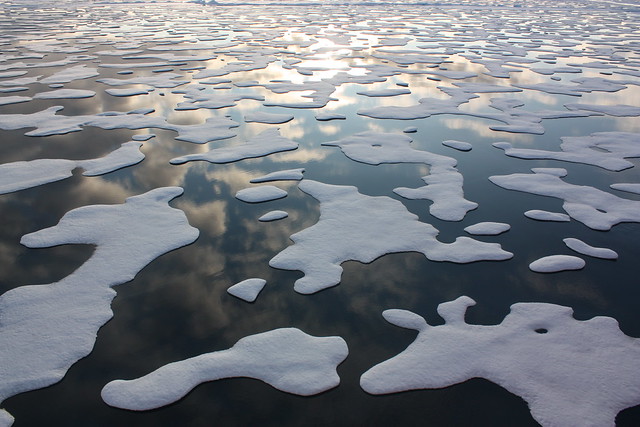
This article was originally published on the World Policy Blog on 13 May 2015.
Today, the global community is devoting unprecedented attention to the Arctic. Most people are primarily concerned with the effects of climate change, as the media often attributes the frequency of recent natural disasters to the significant warming of the Arctic. Meanwhile, businessmen are exploring new profit-making avenues through the extraction of the region’s rich natural resources, along with the development of the Northern Sea Route. Military officials are spending time and resources estimating emerging threats to regional security, while seeking appropriate ways to prevent them. Politicians of both Arctic and non-Arctic states are eager to participate in its exploration, weighing the pros and cons of their further involvement in Arctic affairs, as well as the expected gains and losses from cooperation or confrontation with other states. Finally, the residents of the Far North humbly are hoping that the new international spotlight their home has acquired will not negatively impact their lives.
Russia, in particular, is fully engaged in Arctic affairs because of the tremendous frontier it shares with the Arctic, including the shelf of the Arctic Ocean—a long international border where much of Russia’s public research and exploratory ventures are invested. The country’s history is immeasurably marked by the unique experience of securing its northern borders, through which the Russian people have developed a keen sense of ice navigation, the construction and supply of northern settlements, their survival in the harsh conditions of the North, and preservation of historical and cultural heritage of aboriginal peoples. Today, all these issues still represent significant challenges for Russia, so a special government commission responsible for the social and economic development of the region, along with the protection of Russia national interests there, was recently established.
The latter task of this commission may become dominant as relations between Russia and the West of late have grown increasingly tense, and Moscow’s quest to defend its Arctic territory may overshadow economic interests. In absorbing the Russian media’s interpretation of this scenario, it clearly appears that public opinion is more inclined to protect national interests in the Arctic than to attract foreign partners to explore and develop it.
At the same time, it is important for Moscow to involve non-Arctic Asian states—China, South Korea, and Singapore—in the development of its Arctic territory, as they all show great interest in Russia’s natural resources in the region, as well as use of the Northern Sea Route. Many legal and geopolitical issues need to be solved before these new parties can fully participate. And though their engagement in the Arctic is still questionable, they may have a large and positive effect.
However, since most Arctic issues are of global importance, the region warrants special attention in Russia and beyond. Its natural and climatic conditions immeasurably hinder individuals’ abilities to exploit its hardly accessible resources. These circumstances offer some incentives for seeking cooperation concerning financial, technological, scientific, and organizational resources. That said, Cold War winds routinely blow through it, and media outlets raise tensions by predicting various disputes over the North Pole’s territories and resources.
The future of the region largely depends on what issues the Arctic states—particularly Russia, U.S., Canada, and Norway—will emphasize. It will also depend on which approach they consider more pertinent: the need for international cooperation, the pursuance of national interests, or understanding of the indivisibility of our planet’s future. In any case, the success or failure of cooperation in the Arctic is the litmus test that will reveal the extent to which world powers are able and prone to negotiate.
Even outside of Arctic state interests, the Arctic is currently experiencing a transformation that forces the global community to pay closer attention to the region and seek avenues of international cooperation. Climatic and environmental changes impact the entire world. Businesses that are dependent on resource extraction from the Arctic may be involved in transport and infrastructure projects, such as the development of the Northern Sea Route and its infrastructure. The Arctic also experiences regular geopolitical and security challenges, such as the discrepancy of the Arctic states’ individual political interests and the desire of non-Arctic states to fit into the regional architecture. All are quite enough to confirm that the atmosphere in this region literally and figuratively influences our future.
Yet in the process of balancing these global concerns, we must also not forget that at stake is the very preservation of traditional cultures of the Arctic’s indigenous population. The Institute of History, Archaeology, and Ethnology of the Peoples of the Far East has done its part in researching the history, culture, and social conditions of aboriginal peoples of the Russian Far East for decades. It is also currently developing a research project devoted to the interests and policies of Asian Pacific states in the Arctic. In this area, international cooperation is on the way and necessary, as Vladivostok is far from the Arctic, but represents a gateway from East Asia to the region.
Victor Larin is Director of the Institute of History, Archaeology and Ethnology of the Peoples of the Far East at the Russian Academy of Sciences, Vladivostok.
For more information on issues and events that shape our world, please visit Security Watch and browse our resources.

